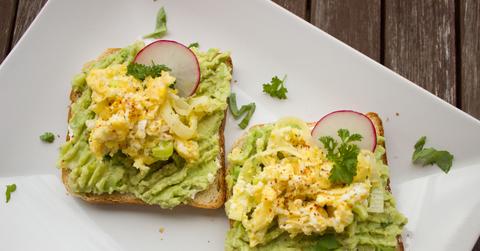Avocado Toast Isn't Great For The Planet—But Won’t Be For Long
With avocados in such high demand, the market has been inundated with unsustainable growing practices. But that may be about to change, as some intrepid Peruvian villagers have found a way to grow the fruits sustainably while also providing workers a living wage.
Updated May 22 2019, 3:58 p.m. ET
It's official: Avocado has surpassed kale as America’s trendiest superfood. But with all the demand, the avocado market has gone way off-kilter with unsustainable practices that amp up deforestation rates, mess with biodiversity of regions, and adversely affect the health of people living in close proximity to the farming and processing sites.
It doesn’t have to be that way. Villagers in Peru’s Apurimac region have figured out a way to grow avocados sustainably with a methodology that also provides workers a living wage. So go ahead and dive in to that green-topped toast. Here’s what’s happening.
We’re having trouble connecting our food with its source.
We’ve grown super comfortable with showing up at a supermarket and filling our baskets with fresh produce without a thought to where it came from and what it took to get it here. Tomatoes in February, pineapple in Alaska, and avocados… everywhere.
California has done its part to produce as much avocado as possible to keep up with demand (the state currently grows 165,000 tons of the fruit annually). But if you’re outside of California, you need to be a bit of a detective about where your fruit is coming from, scale back on your consumption, or turn to pea mash to satiate your toast-topping cravings.
One Peruvian woman is taking the avocado industry to task, and transforming farming methods.
Candelaria Pillaca has been a farmer for years. But five years ago, the Apurimac-based Peruvian has focused on producing avocados, EcoSalon reports.
Pillaca found out about a savings and credit program through World Neighbors, an organization currently working with 500,000 people internationally by offering loans, training, and education so communities and individuals can solve challenges of disease, hunger and poverty in poor areas around the world. Through this partnership, Pillaca learned about organic farming, fertilization, water conservation, and basic accounting.
Her burgeoning avocado plantation now supports Pillaca and her family. The farm is organic and utilizes a drip irrigation system, crop diversification, and utilizes organic fertilizers from animal waste and compost. Instead of clearing forests for avocado planting, Pillaca has figured out how to incorporate avocados into an existing and diverse farm.
Candelaria’s methods are spreading—and could soon be coming to a supermarket near you.
Based on Pillaca’s success, villagers in her region are following in her footsteps. As these biodiverse farms spread and offer many more health and ecological benefits than their monoculture counterparts, it may only be a matter of time before sustainable avocados are the norm—and no longer coming at such a cost.
